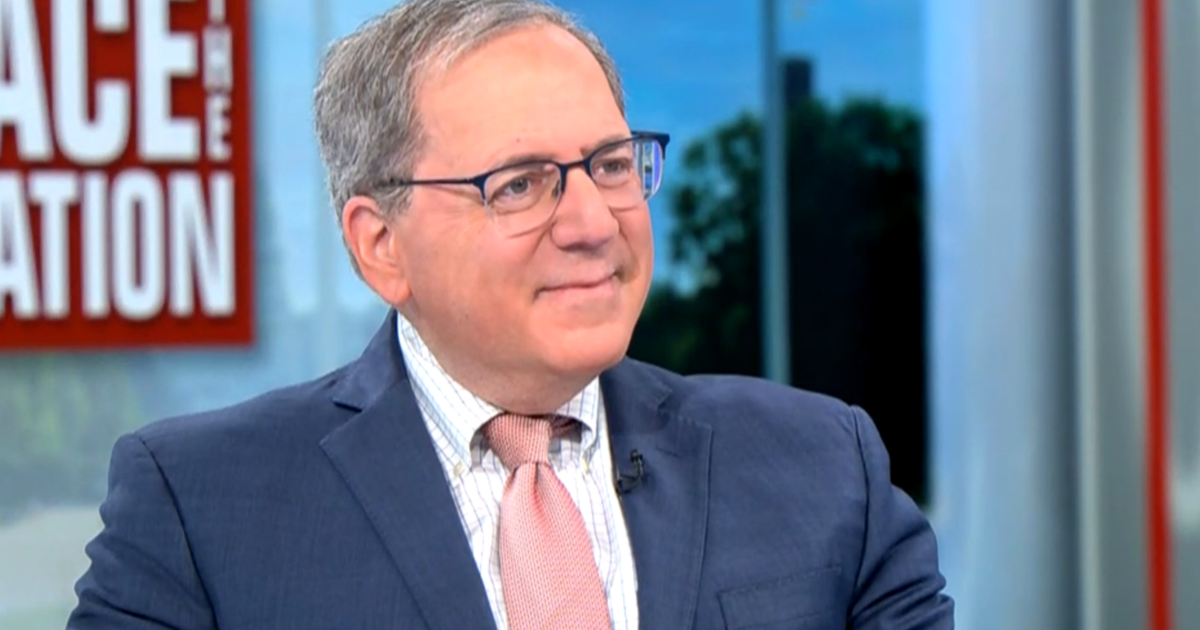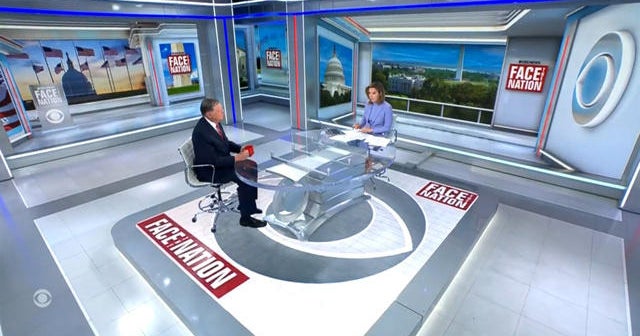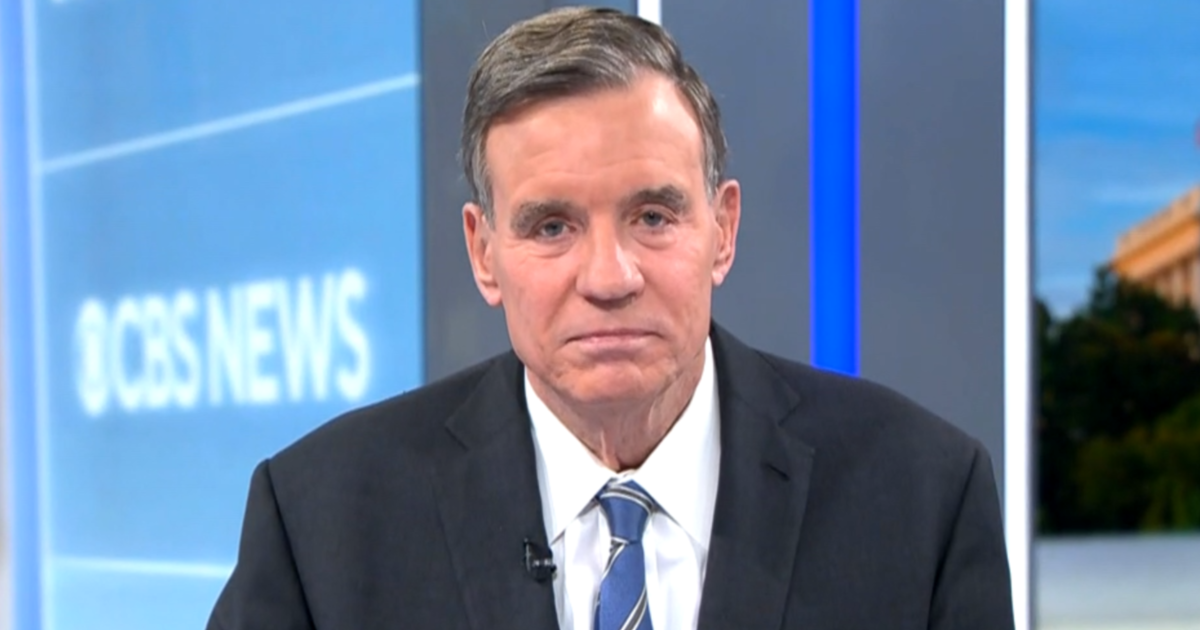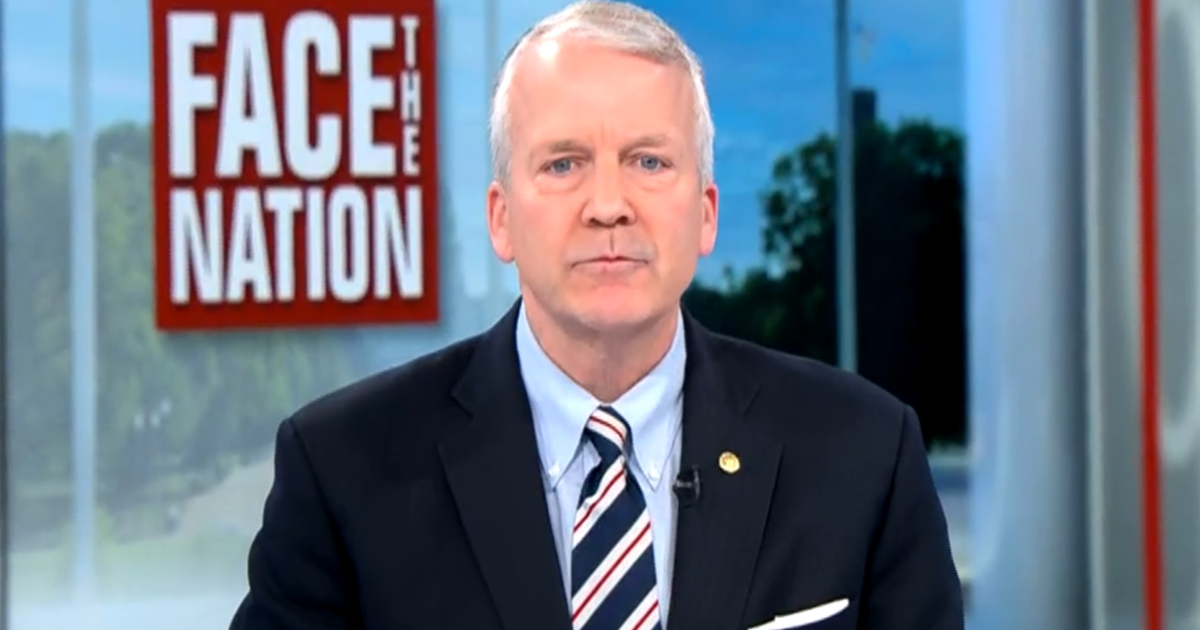Transcript: CIA Director Mike Pompeo on "Face the Nation," Jan. 7, 2018
President Trump brought senior members of his national security team along with him to Camp David this weekend to brief Republican leaders in Congress about a range of foreign issues facing the U.S. In just the past week, North Korea and South Korea reopened lines of communication, the U.S. cut off aid to Pakistan and the administration has grappled with the fallout over massive protests in Iran.
CIA Director Mike Pompeo was one of the administration officials on hand at Camp David to keep lawmakers abreast of the U.S. position on foreign policy issues. Pompeo became CIA director nearly a year ago after serving in the House, where he was a prominent member of the House Intelligence Committee.
The following is a transcript of the interview with Pompeo that aired Sunday, Jan. 7, 2018, on "Face the Nation."
JOHN DICKERSON: Good morning and welcome to Face the Nation. I'm John Dickerson. With temperatures getting down to the single digits in Washington this weekend, the president, members of his cabinet, and the Republican congressional leadership left the city and huddled at Camp David to talk about priorities for the new year. C.I.A. director Mike Pompeo was at Camp David for the meetings but is back in Washington and joins us this morning. Welcome, Mr. Director.
MIKE POMPEO: John, thank you for having me on this morning.
JOHN DICKERSON: The president said he is a stable genius. Is he?
MIKE POMPEO: I'm with the president nearly every day. We engage in complex conversations about some of the most weighty matters facing the world. I deliver to him this exquisite product that's been developed by my officers. He engages in a way that shows his understanding of the complexity. He asks really hard questions. He delivers policy outcomes based on the information that we provide him. My observation of the president is that, you know, we deal in serious matters and that this book is in no way that.
JOHN DICKERSON: I'm going to get to the serious matters in a minute, but take- but give us an example of this. You know, there is this book you referred to. It's got a lot of stories. There's a lot of debate about the veracity of them. Give us one of these penetrating questions, one of these insights the president has had.
MIKE POMPEO: Sure. I'll give you- I'll give you a really good example. It was from early spring. So I'd been serving for a couple of months at this point if I have the timing right. And there was this question about Syria. Was this in fact the Assad regime that had used chemical weapons? That's an intelligence question in the first instance. Can you demonstrate that it was truly chemicals? Did they- Were they used against civilians?
Was it the Assad regime that had done that? And he called me up and had three very direct questions. Basically what I just laid out for you. "Mike, I need you to answer for- those for me as quickly as you can." And then we came back the next day and gave him what we knew at that point. He sent us back for a little more clarity so that we were confident in what we were doing before he made what he viewed as a very important foreign policy decision about how to respond to that. I could- I could give you countless other examples, John.
JOHN DICKERSON: So it seems to me we have a situation here where on the one hand you have the accounts in this book which would, if- if it were true and there were questions inside the administration about the president's ability to perform his office, that it would put a duty on those working around him to speak up.
And then on the other side, you have what could be a fundamental smear against democracy. Which is to say the fitness of the president, this isn't just some political critique. This is about whether he can perform, which goes to the heart of what's going on. Those are it seems to me the two options. Is that what way you see it?
MIKE POMPEO: I can only give you my experiences, John. I haven't read the book. I've got plenty of important things to deal with. I don't put this as one of those. But my observation is that my dealings with the president on some of the most important issues that the president has to face are as professional and as thoughtful as the American people deserve. The president's handling these duties in a way that I'm incredibly proud of to be part of his team.
JOHN DICKERSON: Let's move to one of those duties, North Korea. The New York Times has a piece in the Times talking about the intelligence failure on- on being able to track the North Korean missile program. And in that piece, it says this. Talking about the intelligence community, "Their inability to foresee the North's rapid strides over the past several months now ranks among America's most significant intelligence failures." What do you think of that piece? And is that right?
MIKE POMPEO: Yeah John, yeah Mr. Sanger just got this one wrong.
JOHN DICKERSON: David Sanger of the New York Times.
MIKE POMPEO: David Sanger, the author of the piece. Look, I've been one who's been candid where the intelligence community has made mistakes, where we have missed things. This is not that. In this case, frankly, before my time, the work that was done to understand Kim Jong-un, to understand the regime, to understand the advancement of his missile program was really first rate. That is, we did understand the progress that he was making. So multiple administrations have had access to that same set of information. And that program has progressed.
JOHN DICKERSON: But it's not just David Sanger making this claim. H.R. McMaster, national security advisor, is quoted as saying that the program has been quicker and the timeline is a lot more compressed than most people believed.
MIKE POMPEO: Yeah, look. You're - you're never going to get the day right or the week right. What intelligence can provide to policymakers is an understanding of capability and capacity, an understanding of motive and intent. We nailed both of those things. And then our best effort to understand how that will proceed, at what pace. We frankly got that mostly right.
JOHN DICKERSON: You- When we last spoke in August, you said an attack from North Korea is not something that is imminent. Where is that? Do you still believe that now?
MIKE POMPEO: I do.
JOHN DICKERSON: When- In October you said North Korea was just a few months away from crossing the threshold to putting a U.S. city at risk of nuclear attack. Where are we now on that timeline?
MIKE POMPEO: That- that remains the same.
JOHN DICKERSON: Still a few months away from that?
MIKE POMPEO: Yes, sir.
JOHN DICKERSON: And where is- and are we-we- Are we three? Are we four?
MIKE POMPEO: Can't give you that kind of certainty.
JOHN DICKERSON: North Korean soldiers, there have been some that have sprinted to freedom. What are we learning from them?
MIKE POMPEO: So two things that our analytic team would identify. One is that this is- we talk about their nuclear force a lot, John. It's a big focus. But I will promise you Secretary Mattis and our team never forgets that they have an enormous conventional capacity as well that threatens not only South Korea but other neighbors. And we-we I don't want to on the show here this morning tell you, but we have what we think is a very good assessment of their military capability. That is, how ready those enormous forces are.
JOHN DICKERSON: You said in December the president's tweets actually help the C.I.A. execute its mission. This week, the president tweeted about his- the nuclear button. How does that help the C.I.A. do its mission?
MIKE POMPEO: Yes, sir. That- that tweet is completely consistent with U.S. policy. The president, unlike previous administrations, has made a real commitment. That is the denuclearization of the peninsula is the mandate. That is what we are going to achieve. The president has made very clear that we're going to do everything we can to do that in a way that doesn't involve military action but has equally made clear that we're not going to stand for allowing Kim Jong-un to hold Los Angeles, or Denver, or New York at risk.
And I think what you saw in that message, the same as the rest of the messages that the president has put out and the State Department has put out, have made that policy crystal clear. And it is important that Kim Jong-un understand that clarity.
JOHN DICKERSON: Some people criticize that tweet and thought it was a little- you know, you don't kind of joke around or you don't be cavalier about nuclear buttons. Is that though helpful? That kind of-of willingness to risk talking about nuclear buttons in a casual way in terms of keeping the other side off guard?
MIKE POMPEO: Boy. I can't tell you that Kim Jong-un has read that tweet because I can't prove it, but I'm confident that he did. And my guess is that as he reads it he's trying to figure out exactly how it is he does what he wants to do, which is keep his nuclear weapons and stay in power. I think that's what you see happening this week, where he's now agreed to have some conversations with the South Koreans.
He is looking for a foothold to walk himself back. This would but entirely consistent with his historical activity. When he sees the threat, he tries to pacify it. And you can be sure that this administration is not going to fall prey to the same trap that previous administrations did.
JOHN DICKERSON: In the narrative so far with North Korea, they have continued testing. The U.S. has said, "Stop testing. We might talk in some fashion." So in that context, this decision to talk with the South Koreans would seem to be a positive step if he's in the mood to step back instead of test more missiles.
MIKE POMPEO: Yes, sir. I hope that's the case. I- I Ever the optimist, always the realist. I hope that's the case. But past history would indicate that this is a feint, this is not likely to lead to any true change in his strategic outlook. That is, he will continue to want to maintain his nuclear capability. And that the president has said is unacceptable.
JOHN DICKERSON: Is all the engagement in the last several months, has your picture gotten clearer, more sharp about the North Korean leader or fuzzier?
MIKE POMPEO: A little more clear. And frankly the focus of the great officers that work for me, their efforts to deliver to the president a little more granularity and a little more color to help understand what not only Kim Jong-un is thinking but those around him. You know, John, we-we don't think Kim Jong-un is getting the straight story from those around him about the tenuous position he finds himself in both domestically and internationally. It is not a good thing, a healthy thing to tell Kim Jong-un bad news.
JOHN DICKERSON: The president this week also tweeted about the deep state. Is there a deep state at the C.I.A.?
MIKE POMPEO: No, sir.
JOHN DICKERSON: Has there ever been one?
MIKE POMPEO: Sir, I've only been there for a little while. I can't- I can't believe that it's ever been there. These are professionals who sacrifice so much to serve America. They're patriots of the truest and highest order.
JOHN DICKERSON: Iran, what's the significance of the protests so far? And is this a turning point? Or is this just a flash point and the regime will continue to have power?
MIKE POMPEO: Difficult to know analytically if this is a turning point. But it is different, John. The protests that we saw in 1999 and 2009 were from elites. This was not that. These were ordinary Iranians. The same people who would enlist in the I.R.G.C., their neighbors are now the ones out protesting.
And they're protesting because they've seen the failed promises of President Rouhani and Zarif, that they haven't been able to deliver the economic outcomes that they said. They said they'd get the JCPOA and food would be plentiful, that commerce would reign, and that jobs would arise. And that simply hasn't happened.
JOHN DICKERSON: The JCPOA is the so-called Iran deal. So in that sense has the Iran deal forced destabilization in Iran? And is therefore that good for- in terms of U.S. interests?
MIKE POMPEO: Well- well, from the C.I.A.'s perspective, I won't get into the policy piece of this one. The C.I.A.'s perspective, what is clear is that there have been economic difficulties in Iran in places outside of Tehran. There is massive unemployment. The- the- What the Iranian people were promised has not happened. They can see that. And thus they have taken to the streets.
JOHN DICKERSON: Let me ask you about Pakistan. The U.S. is cutting off aid to Pakistan. That's a- Pakistan is a nuclear power. Is it a good idea pressuring Pakistan, given all that's on the rest of the plate in the United States with a nuclear power?
MIKE POMPEO: John, again, I'm going to avoid the policy that you asked about, but I'll talk to you from the intelligence perspective what we see. We see that Pakistan is continuing to provide safe harbor havens inside of Pakistan for terrorists who present risks to the United States of America. We are doing our best to inform the Pakistanis that that is no longer going to be acceptable. So this- this conditioned aid, we've given them a chance. If they fix this problem, we're happy to continue to engage with them and be their partner. But if they don't, we're going to protect America.
JOHN DICKERSON: Haven't we always though- We get a lot of the U.S. intelligence benefits from things that the Pakistanis let the United States do as well. And so isn't there kind of a relationship that may not be perfect, but for the bad things they do they allow U.S. counterterrorism forces to benefit from staging or other benefits out of Pakistan? So isn't that at risk as a national security problem for the United States?
MIKE POMPEO: The president has made very clear that he needs Pakistan to cease being a safe haven for terrorists that threaten the United States of America. End. Period. Full stop.
JOHN DICKERSON: Let me ask you about the reauthorization of the FISA so-called 702--
MIKE POMPEO: Yes, sir.
JOHN DICKERSON: --section. There's some question about how long to reauthorize it. What is the C.I.A.'s position about this program, which allows surveillance of foreign people but also critics believe allows a backdoor to- to gaining information about Americans?
MIKE POMPEO: John, the- section 702 is an important component of American national security. It allows us, the C.I.A., to observe communications from non-U.S. citizens, persons outside of the United States. That's- that's central to our mission. And so we are very hopeful that we can reach an accommodation, that we can get to the right place. And I understand it may well come to a vote this week.
I hope that's the case. I hear the critics from the other side. I understand their concerns. I hope that we can accommodate them in a way and achieve our national security mission while doing- while continuing to protect American's privacy. Those are both important missions. I think we can do them both.
JOHN DICKERSON: Let me ask you a final question here. This is an election year, 2018. We have had a lot of talk about the Russians' effort to destabilize the 2016 election. Are the Russians engaged in trying to undermine the election? And do you worry about that this year?
MIKE POMPEO: Yes, sir. I do.
JOHN DICKERSON: Are they currently doing that?
MIKE POMPEO: Yes, sir. Have been for decades. So, yes, I- I continue- continue to be concerned not only about the Russians but about others' efforts as well. We have many foes who want to undermine Western democracy. So there's this- this Washington-based focus on Russian interference. I want to make sure we broaden the conversation.
We have an important function as part of the American national security team to keep the American elections safe, and secure, and democratic. We are working diligently to do that. So we're going to work against the Russians or any others who threaten that very outcome.
JOHN DICKERSON: All right. Director Pompeo--
MIKE POMPEO: Thank you, John.
JOHN DICKERSON:
--thanks so much for being with us. And stay with us. We'll be back in one minute to talk with Kentucky Republican senator Rand Paul in his first Sunday show appearance since being injured in an altercation with his neighbor. Stay with us.



